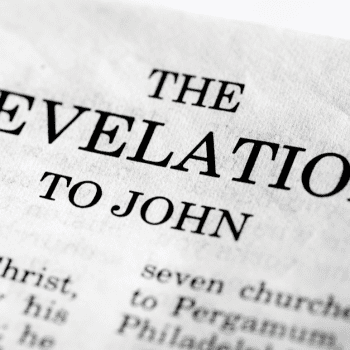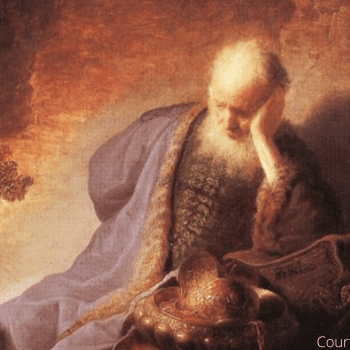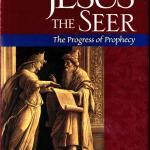Monday: Read 1 Thess 4:9-18
Beginning in 4:9, Paul appears to be responding to questions raised to him—perhaps in a letter (see: 4:9, 13; 5:1).
The first question is concerning brotherly love (9). The problem here was caused by the Roman practice of patronage. It appears that some of the Thessalonians were relying on their patrons for support (as clients). The involvement in the system caused them to be involved in affairs that stained the reputation of the church and brought dissension among fellow believers. This likely occurred when one person’s loyalty to a patron came into conflict with another person’s loyalty to a rival patron.
Paul responds that they have no need for anyone to write them. After all, “you yourselves are taught by God to love one another” (9). Paul then adds that they are to “lead a quiet life, attend to your own business and work with your hands” (11), “so that you will behave properly toward outsiders and not be in any need” (12).
The commands here relate to the engagement with political affairs. For Paul, they need to stay out of such matters. For Paul, the solution was to “work with your hands.” Manual labor, of course, was seriously looked down upon. It was much easier and financially and socially beneficial to attach oneself to a patron.
The second question pertains to those within the church who had already died. There was likely a high level of expectancy related to the return of Christ. The question became: “will those who died miss out on the Second Coming of Christ?” Paul’s reply is to assure them that just as we believe in Jesus’ death and resurrection, so also we are convinced that the dead will return with Christ.
Though this passage is often tied to the idea of a rapturing of Christians to heaven for a period of three-and-a-half or seven years, the text is instead describing the arrival of a great king to a city. When a king arrived, various officials went out to greet the king and escort him back into the city. The noblest officials, of course, were the first to go out. They were then followed by various others—all in order of their relative honor.
Thus, when Paul says that “the dead in Christ will rise first” (16), he is stating that those who have died are the most distinguished individuals and, as such, they will be the first to meet Christ and lead His escort back to the city.
In other words, the passage is not about Christians going up, but about Christ coming down. Sure, the followers of Christ are resurrected and go up, but only to escort Christ down!
Questions to ponder/discuss:
- Too often Christians look to the day when they might escape the present world and go to some heavenly bliss for eternity. One of the dangers of this line of thinking is that it often lacks concern for the present world. After all, the thinking goes, the present world is not our home. This is not, however, what the NT teaches. The kingdom of God comes down out of heaven to the Earth (Rev 21:10). What do you think this might mean with regard to our responsibility in caring for creation?
Tuesday: Read 1 Thess 5:1-11
If 4:13-18 addresses the fate of the dead at the return of Christ, then 5:1-11 addresses the fate of the living. Paul contrasts believers and unbelievers both with regard to their destinies and with regard to their conduct.
It is not uncommon for many to inquire as to when the “Day of the Lord” will come (2). The “Day of the Lord” is when God punishes the unbelievers and vindicates His people.
Paul explains that while they [unbelievers] “are saying ‘peace and safety’” the day of judgment will come suddenly. Believers, of course, are not saying peace and safety. After all, their present suffering is anything but peace and safety.
Paul responds by noting that when the Lord will return is not known. Even though we do not know when Christ will return, we are living as people of the day. As such we are to be characterized by faith, love, and hope (8). This is what it means to be “sons of the light” (5) and “sons of the day” (5, 8). As people of the day, we are not destined for wrath (9).
Paul contrasts “of the day” and “of the darkness” (5). The contrast is certainly ethical. Those who are “of the darkness” both “sleep” and “get drunk at night” (7). The contrast, however, extends beyond ethics and indicates one’s status before God. One group is destined for wrath and the other has obtained salvation (9). In addition, those who are “of the day” are determined to endure until the “day of the Lord” (2) and are to “encourage one another and build up one another” (11).
Questions to ponder/discuss:
- It is important to recognize that though we cannot know the time we must be prepared! What do you think being prepared for the Lord’s return means?
Wednesday: Read 1 Thess 5:12-28
In 5:12-22, Paul concludes his first letter to the Thessalonians. Interestingly, he brings the “request” and “exhortation” from 4:1 to a climax in 5:12 by repeating the key terms, “request” (12) and “exhort” (14).
Paul’s first request relates to their leaders. They are to “appreciate those who diligently labor (12). We have no idea how the leaders in Thessalonica were put in place. After all, Paul was only in the city for 3 weeks. Nonetheless, the leaders are to be esteemed because of their work (13)
In 5:14-22, Paul addresses their responsibility toward various groups by using 14 imperatives (commands).
In 5:14, Paul addresses their responsibility toward one another.
In 5:15, he addresses their responsibility toward those outside the community of the church. To not repay “evil for evil” and to seek the good “for all people” (15) would certainly set the people of God apart from their Roman counterparts. It is also an incredible request in light of the hostilities they faced. This was especially difficult for those who have lost their honor in society. In the Roman world, it would be expected that they respond in kind and regain their honor.
In 5:16-18, Paul addresses their responsibilities before God. They are to “rejoice always,” “pray without ceasing” and “in everything give thanks” (16-18).
Finally, in 5:19-22, Paul addresses prophecy within the community. It appears that some were prohibiting prophecy. Paul gives five exhortations. They are not to quench the Spirit (19) or despise prophecies (20). Instead, they must “examine everything” (21) “hold fast” to what is good (22), and “abstain from every form of evil” (22). Joel Green summarizes Paul’s words well, “the church should not treat true prophecies lightly, nor should they adhere to revelations that are patently false.”[2]
The letter comes to a close in 5:23-28. The goal is that their whole being be kept blameless “at the coming of our Lord Jesus Christ” (23).
Questions to ponder/discuss:
- Memorize 1 Thess 5:16-18 and meditate on these verses daily for the next week. As you do, pray and ask God to help you learn to “rejoice always” (16) and “in everything give thanks” (18).
Thursday: Read 2 Thess 1:1-12
As was the case with the first letter to Thessalonica, Second Thessalonians was also written by Paul, Silas, and Timothy (1). The same concerns over the return of Christ are present in this letter.
Paul begins by affirming the Thessalonians. They have continued to persevere “in the midst of all your persecutions and afflictions” (4). Paul says that their suffering “is evidence that God’s righteous judgment” (5). In fact, their suffering is evidence that they will be “considered worthy of the kingdom of God” (5).
Paul then assures them that “God is just” (6). Those who have been the source of their suffering will be justly punished (6). In fact, “those who do not know God”—perhaps gentiles—and those who “do not obey the gospel of our Lord Jesus” (8)—perhaps Jewish persons—will “pay the penalty of eternal destruction” (9). This will occur “when the Lord Jesus will be revealed from heaven” (7), or “on that day” (10).
The goal is that “God will count you worthy of your calling” (11), in order that the “name of our Lord Jesus will be glorified in you” (12).
Questions to ponder/discuss:
- It seems that “suffering for the sake of the kingdom” is seldom mentioned in many western churches. Why do you think that is? What do you think “suffering for the sake of the kingdom” looks like for you?
- Should we be more concerned with the nature of a person’s eternal suffering or with making sure that people do not enter it?
- Make it your focus this week to be found “worthy of your calling.” Then either journal or report to others instances in which such a focus made a difference in how you handled/responded to a situation.
Friday: Read 2 Thess 2:1-12
Just as Paul did in his first letter to the Thessalonians, he reiterates “we request you, brethren” (1). Paul addresses them “with regard to the coming of our Lord Jesus Christ and our gathering together to Him” (1). Interestingly, Paul addressed both of these topics in his first letter to the Thessalonians.
Apparently, the Thessalonians received some form of correspondence, which was allegedly from Paul, saying that the “day of the Lord has come” (2). Paul’s response is that the “day of the Lord” has not yet come. The particulars of his response, however, are quite difficult to discern. In fact, this may be the most difficult passage in the NT.
There are several reasons for this. First, what Paul says in 3-4, he has apparently already told them (5). This means that Paul does not explain what he means or elaborate. Secondly, what Paul says in these verses does not appear anywhere else in the NT.
Paul’s answer is that the day of the Lord has not arrived because the “apostasy” has not yet occurred and the “man of lawlessness” has not been revealed (3).
What Paul means by “the apostasy” is disputed. Perhaps the most common understanding is that it refers to a period of deception within the church.
What Paul means by the “man of lawlessness” is equally opaque. Whoever he is, his coming is in accord with Satan and “power and signs and false wonders” (9). When the man of lawlessness comes, he will exalt himself as god and take “his seat in the temple of God” (4). The “temple of God” here seemingly refers to the people of God (i.e., the church). After all, throughout the NT the “temple of God indicates either the church or the body of Christ.[3]
Equally, if not, even more difficult is Paul’s indication that something is restraining the man of lawlessness. Whoever/whatever[4] it is, they “know” (6).
Again, we are simply unsure what Paul means here. In the words of NT scholar Joel Green, “this Gordian knot has been nearly impossible to cut!”[5]
Whoever the man of lawlessness is, he is one “whom the Lord will slay with the breath of His mouth and bring to an end by the appearance of His coming” (8).
Questions to ponder/discuss:
- Since this passage is so difficult to wrap our heads around, perhaps our best solution is to focus not on speculative prognostications but on modeling Christ in our everyday life and persevering faithfully in suffering until He comes.
[1] This guide is meant to be done either as a group study over the course of 2 or 4 meetings (Day 1-5; 6-10; 11-15; 16-20), or as a private devotion over the course of 4 weeks (or a calendar month—5 lessons per week).
[2] Green, Pillar, 266.
[3] Matt 26:61; 1 Cor 3:16, 17(2x); 2 Cor 6:16(2x); 2 Thess 2:4; Rev 3:12; 7:15; 11:1, 19.
[4] The Greek is difficult here. It refers to “what is restraining” (neuter; 6) and “the one who is restraining” (masculine; 7).
[5] Green, Pillar, 314.
















